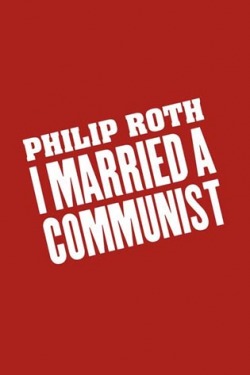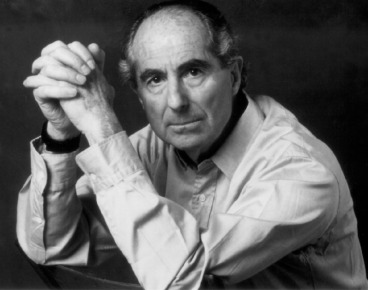But I would still press you to give I Married A Communist a second-look. In Roth’s characteristically sharp prose, a not too distant past is filleted and laid bare in all of its flashy goriness. The “threat” of communism, the hysteria of the political right, the conspiracy theories, the stifling of free speech…all of these are depicted with a realist’s attention to detail. This post-war era might seems like another world, and my generation often scoffs at the over zealous age of McCarthyism. Yet has much really changed in our nation’s sentiment? Do politicians not still use fear to motivate the masses?
A simple plot synopsis of this novel might not make you jump up and run for the library or the nearest bookstore. If you’re not stirred by what I write below, don’t assume that the book will not excite or thrill—one reads Philip Roth for much more. The genius of this author lies in his satirical and imaginative prose, his ability to convey a sentiment or a person in all of its glory and baseness. Philip Roth should be read, and this book ranks high on my list of favorite Roth novels.
In his typical (and somewhat frustrating) style, Roth writes from the perspective of his literary alter ego, Nathan Zuckerman. Zuckerman, an older and isolated writer, meets with a former English teacher, and the two of them dive into a shared past. As a young boy, Zuckerman befriends his teacher’s brother, Ira, a somewhat famous radio star known as Iron Rinn. Iron Rinn stars on a show that reveals the struggles of the common people, and in his personal life, Ira also champions the cause of the working class, the proletariat. A fascinating character, Ira is a man of limited intelligence but extreme passion. As a young soldier and a workingman, Ira fell under the tutelage of communist individuals, and now, older and somewhat famous, Ira views Nathan as his own young person that he can lead towards the light.
With all of his novels, anti-Semitism finds its way into the plot, and Roth’s Jewish characters face discrimination both politically and ethnically. As the title suggests, Ira is portrayed as a communist by the media and by his famous wife, Eve Frame. The relationship of Eve and Ira dominates much of the plot, and the reader is taken in and out of their domestic scrabbles (most of which involve Eve’s adult and narcissistic daughter). At the dissolution of their marriage, Eve writes a scathing book revealing certain details about Ira and his political leanings. Her anti-Semitism is brought into question as the motivating factor behind her attack. Whether or not her book holds much truth is up for debate. The person of Ira is revealed through his brother’s memories and Nathan’s recollections. While undeniably both men agree that Ira had leanings towards communism, neither can determine the whole truth of the man, a fact that pervades all human relationships.
The novel paints a dark and disturbing part of America’s history. It reveals our tendency, as human beings, to judge and to use fear to obtain what we desire. The mannerisms, the political speak, the blind acceptance of certain unacceptable behavior is perfectly captured and displayed in this novel. I would highly recommend it to anyone with a passion for literature or for American history. Philip Roth deeply satisfies on both accounts.


 RSS Feed
RSS Feed
